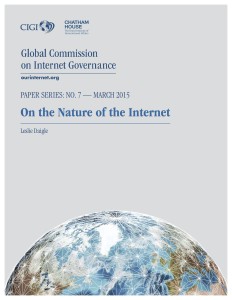A visible product of my “self-funded sabbatical” is now published!
On the Nature of the Internet, by Leslie Daigle
My aim and hope is that it will provide some further insight into what not to do to the Internet intentionally or inadvertently, so that collectively we can agree on the need to find better ways of dealing with the very real policy issues that need to have solutions.
The Internet has proven itself highly accommodating of change over the decades — today’s Internet looks nothing like the network of networks that existed 25 years ago, when commercial traffic was still prohibited from traversing it. But, most of the changes that it has faced have come from technological or direct usage issues. In today’s reality, many of the forces at play on the Internet are direct or indirect outcomes of (government and regulatory) policy choices.
If we want to continue to have a healthy and evolving Internet, we need to learn how to make policies that are consistent with, or at least not antithetical to, what makes the Internet work.
So, when I was asked last year to write a paper on the nature of the Internet for the Global Commission on Internet Governance, I turned first to the work we’d done at the Internet Society on the “Invariant Properties” that are true of the healthy Internet. In the paper that I wrote for GCIG, now published as their 7th paper for this commission, I tackled the questions of policy choices that are driving us towards national networks and localized abuse of Internet infrastructure, through the lens of those 8 invariant properties of Internet health.
Here’s the executive summary:
This paper examines three aspects of the nature of the Internet: the Internet’s technology, general properties that make the Internet successful and current pressures for change. Current policy choices can, literally, make or break the Internet’s future. By understanding the Internet — primarily in terms of its key properties for success, which have been unchanged since its inception — policy makers will be empowered to make thoughtful choices in response to the pressures outlined here, as well as new matters arising.
Have a read of the paper, and let me know what you think — other examples of policy driving us in the wrong direction? New approaches to policy-making that will help us solve problems and have a healthy Internet? I’d love to hear your perspective, and — more importantly — see a broader discussion develop around different perspectives.

